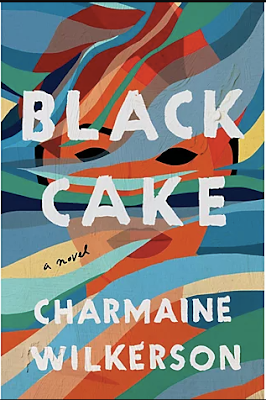The novel Black Cake has the most complicated plot that I could imagine. Somehow it also tells a beautifully simple and direct story. Charmaine Wilkerson has written a most wonderful book."The sugar began to darken and smoke as Pearl stirred. When it was almost black, she took a small pot of boiling water and poured its contents onto the sugar, turning her face away as the mixture sizzled and splattered. She would add the blacking to the batter to darken it, but only after she had whipped the butter, added the eggs, flour, spices, and, finally, the mixture of fruits that had been soaking for weeks in dark rum and port. This cake would be a work of art." (Black Cake, p. 117)
“His mother used to say she would make a black cake for Byron and Benny when each of them got married, but neither of them had. Ma’s cake was a work of art, Byron had to admit. That moist, loamy mouthful, the tang of spirits behind the nose. But Byron had never shared his parents’ emotional attachment to the recipe. Tradition, his ma used to say. But whose tradition, exactly? Black cake was essentially a plum pudding handed down to the Caribbeans by colonizers from a cold country. Why claim the recipes of the exploiters as your own?
“Tradition? How about coconut gizzada? How about mango ice cream? How about jerk pork, rice and peas, Scotch bonnet peppers, coconut milk, yellow plantains, and all those flavors that Byron had come to enjoy, thanks to his mother’s cooking? Now, that was what he called island food. But no, these had never been enough for his ma. More than any other recipe, it was the black cake that brought that creamy tone to his mother’s voice. That shine to her eye.” (p. 95)
“What about the classic Christmastime fruit cake? In Britain, it’s often made with cane sugar from the tropics. In the Caribbean, it’s made with raisins and currants imported from colder countries. My grandmother, who was English but spent years living in Trinidad with her missionary parents, makes a divine rum cake, Caribbean style. She calls it black cake. But is it really Caribbean? Cane sugar didn’t even originate in that part of the world. It arrived from Africa, which in turn got it from Asia. So, you tell me, whose cake is it?” (Black Cake, p. 250)
Eventually, when going through their late mother’s kitchen, Benny and Byron find the jar of booze-soaked fruit that she kept behind the canned goods. Then Benny finds her mother’s recipe:
“There it is, where it has always been, a piece of folded, lined notepaper where her mother had scribbled down the recipe for her black cake. Benny unfolds the paper and runs her finger down the list of ingredients. Rum, sugar, vanilla. And the occasional verb. Cream, rub, mix. It is only now that Benny realizes that the recipe has no numbers, no quantities at all. Wait, was it always this way? It’s the same one from her childhood, she’s sure of it. Benny sees, now, that her mother’s recipe was never so much a list of firm quantities and instructions as a series of hints for how to proceed. What Benny learned from her mother had been handed down through demonstration, conversation, and proximity. What Benny learned from her mother was to rely on her own instincts and go on from there.” (p. 296)
There’s much more than cake in this fascinating novel! I definitely recommend it — and thank Evelyn, as it was another of her suggestions. And if you should want to try baking this exotic cake, there are many traditional recipes on the web, including one from the Washington Post here:
Review copyright © 2022 mae sander



10 comments:
Oh, this looks interesting! Thanks for featuring Black Cake. Enjoyed all the excerpts. :)
I've heard many good things about it, but yours is the first complete review I've read. Thanks!
I also loved the book and one day I plan on banking a black cake.
Glad for once I am not tempted to buy this book as I´m not into sweets ;-)
Sounds interesting, though!
Funny, I immediately thought of my Irish mother's Christmas pudding! I didn't love it growing up but would love it now.
We used to make black cakes for Christmas, in Jamaica, and I stayed up at night to check on them, as they were steamed, not baked.
This sounds so interesting!
I have some fruit cake recipes coming soon but they definitely won't be black!
Thanks for sharing this with Weekend Cooking.
Sounds like a good read.
I've been hearing good thinmgs about this book, the cake does remind me of a Christmas pudding.
Interesting to hear about Black Cake ... and how it's made. Makes me curious to try it. both the dish and the novel. Sounds like you liked the latter.
Post a Comment